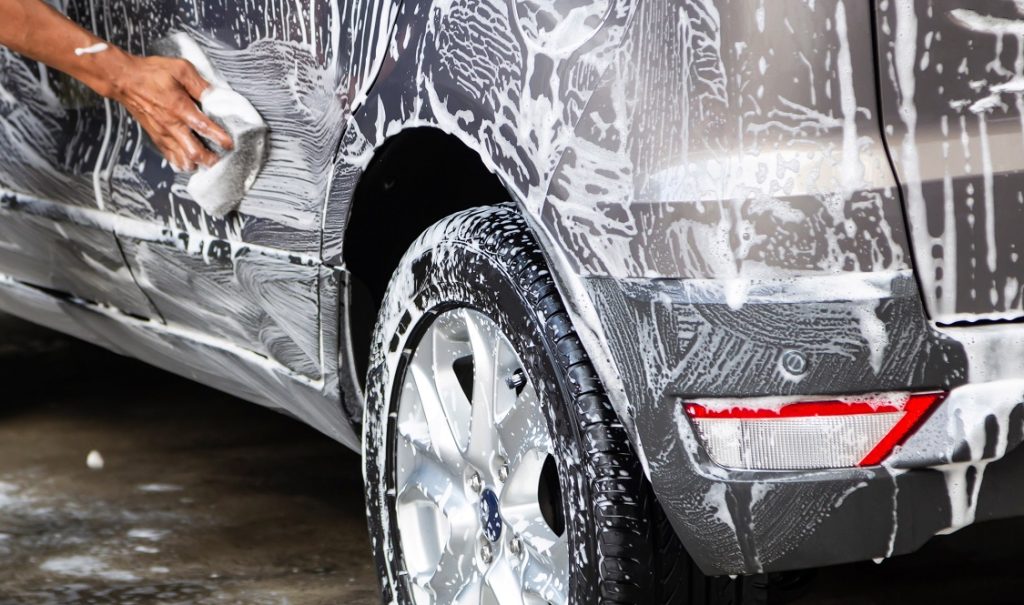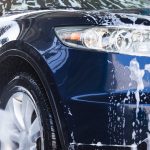Car aficionados, both seasoned drivers and novice enthusiasts alike, often find themselves pondering a common yet perplexing question: does shampoo damage car paint? This seemingly simple query unveils a multifaceted world of automotive care, where the choices we make in cleaning products can have a profound impact on our vehicle’s exterior. In this extensive guide, we will embark on a thorough exploration, unveiling the secrets behind preserving your cherished car’s pristine finish.
Understanding the Impact of Shampoo on Car Paint
At the heart of the matter lies the composition of car shampoo. It’s not just about cleaning – it’s about understanding the chemical interplay between the shampoo and your car’s exterior.
The Composition of Car Shampoo
Diving into the world of car shampoo ingredients reveals a spectrum of components, each with its unique role. pH balance, detergents, and various additives contribute to the overall effectiveness of a shampoo. But how do these elements interact with your car’s paint? We’ll unravel the science behind the bubbles, ensuring you make an informed choice when selecting your next car shampoo.
How Shampooing Affects Different Paint Types
Cars come adorned with an array of paint types – metallic finishes that catch the sunlight in a mesmerizing dance or matte paints that exude a subtle elegance. Our exploration extends beyond the superficial question and ventures into the nuanced impact of shampoos on these diverse paint categories.
Tips for Metallic Finishes
For those with a penchant for metallic sheen, the quest for the perfect shampoo takes on a new dimension. We’ll explore tips and tricks to enhance the brilliance of metallic paints while navigating potential risks that certain shampoos might pose.
Preserving the Elegance of Matte Paint
Matte finishes, with their velvety allure, have carved a niche in the automotive world. However, caring for matte-painted cars demands a specialized approach. We’ll uncover the secrets to keeping your matte finish looking sleek without compromising its unique texture.
Common Myths Debunked: Separating Fact from Fiction
Misconceptions about shampoo damaging car paint often circulate, creating a cloud of uncertainty. Let’s dissipate this fog by debunking prevalent myths and shedding light on the truth.
Myth: All Shampoos Are the Same
Not all shampoos are created equal, and assuming they are could lead to unintended consequences for your car’s paint. We’ll explore the truth behind this common myth, delving into which ingredients to avoid and which ones contribute to the longevity of your car’s paint.
Myth: Washing Frequency Doesn’t Matter
The frequency of car washing is a topic often debated among enthusiasts. We’ll delve into the impact of shampooing frequency on your paint’s health, providing valuable insights into establishing a proper washing routine.
Choosing the Right Shampoo for Your Car
Armed with a deeper understanding of the nuances, let’s shift our focus to the proactive aspect – selecting the best shampoo for your beloved vehicle.
Key Ingredients to Look For
The journey to find the ideal shampoo leads us through the realm of key ingredients. From the significance of pH balance to the benefits of added wax content, we’ll guide you in deciphering the labels, ensuring you choose a shampoo that caters to your car’s unique needs.
Top Recommended Car Shampoos
To simplify your decision-making process, we’ve meticulously curated a list of the top car shampoos in the market. These recommendations consider factors like effectiveness, safety, and overall value for money, empowering you to choose with confidence for a dazzling finish. (See Also: Will Isopropyl Alcohol Damage Clear Coat? Tips for Safe Car Cleaning)
Mastering the Art of Proper Car Washing Techniques
Beyond the shampoo selection lies the intricate dance of proper car washing techniques. Elevate your car-cleaning game with expert strategies that safeguard your paint and enhance your overall washing experience.
Two-Bucket Method Unveiled
The two-bucket method is more than a technique; it’s a philosophy embraced by professionals for its efficacy in minimizing scratches and swirls during washing. We’ll provide a detailed, step-by-step guide, explaining how this method ensures a thorough and safe cleaning process.
Drying Techniques for a Spotless Finish
Proper drying techniques are often the unsung heroes of a flawless exterior. We’ll explore the importance of using the right tools and methods to ensure your car dries spotlessly, preserving its shine in the process.
Expert Tips: Safeguarding Your Car Paint During Shampooing
Car enthusiasts understand that maintaining the exterior of their vehicle is an art, and car shampooing is a crucial stroke in this masterpiece. To help you navigate the delicate balance between effective cleaning and paint protection, here are some expert tips that go beyond the basics.
1. Choose pH-Balanced Shampoos for Harmonious Cleaning
Begin your car-cleaning ritual by opting for pH-balanced shampoos. These formulations are designed to maintain the natural acidity of your car’s paint, preventing any adverse effects on its protective layers. By striking the right balance, you ensure a gentle yet effective cleaning process that doesn’t compromise your paint’s integrity.
2. Mind the Detergent Content: A Delicate Dance
While a certain level of detergent is necessary for cleaning, excessive content can be detrimental. High detergent concentrations may strip away protective wax layers, leaving your paint vulnerable. Look for shampoos with balanced formulations that cleanse thoroughly without compromising your paint’s defense mechanisms.
3. Dilute According to Instructions: Precision Matters
Every shampoo comes with specific dilution instructions. It’s not just a suggestion – it’s a roadmap to an effective wash. Using overly concentrated solutions can result in soap residue, potentially leaving a film on your car’s surface. Follow the guidelines diligently for optimal results.
4. Employ the Two-Bucket Method: Shield Against Contaminants
Enter the world of professional-grade car washing with the two-bucket method. This technique involves having one bucket for soapy water and another for rinsing. By keeping dirt and debris separate, you minimize the risk of reintroducing contaminants into the cleaning process, thus reducing the chances of scratches on your car’s surface.
5. Use Microfiber Wash Mitts: Velvet Touch
Upgrade your car-cleaning arsenal with high-quality microfiber wash mitts. The soft, lint-free texture of microfiber ensures a gentle cleaning experience, reducing the risk of micro-scratches on your car’s paint. This small investment goes a long way in maintaining the flawless finish of your vehicle.
6. Avoid Dish Soap: A Recipe for Disaster
Resist the temptation to use dish soap as a makeshift car shampoo. The harsh chemicals in dish soap can strip away protective layers and harm your paint over time. Stick to products explicitly designed for automotive use to ensure your car gets the care it deserves. (See Also: Aquapel Vs. Rain-X: Choosing the Best Windshield Treatment)
7. Pay Attention to Drying Technique: Pat, Don’t Rub
Post-shampooing, adopt a systematic and gentle drying technique. Pat your car dry with a soft microfiber towel rather than rubbing, minimizing the risk of swirl marks and water spots. This extra step in the process adds a layer of care to your paint’s longevity.
8. Consider Waterless Shampoos: Eco-Friendly Elegance
For a quick, eco-friendly option between traditional washes, explore waterless shampoos. These formulations can effectively clean your car without the need for a water rinse, showcasing an innovative approach to both convenience and environmental responsibility.
9. Regularly Wax Your Car: Armor for Your Paint
Maintain a regular waxing schedule to provide an additional layer of protection to your car’s paint. Wax acts as a shield against environmental contaminants, UV rays, and other elements, enhancing the overall shine and extending the life of your paint.
10. Schedule Professional Detailing: Masterful Care
While DIY efforts are commendable, periodically entrust your car to professional detailing services. Detailers possess the expertise and tools to deep-clean, polish, and protect your car’s paint. This comprehensive approach ensures your vehicle stays vibrant and well-protected for the long haul.
Incorporating these expert tips into your car-cleaning routine transforms it into a ritual of care and preservation. By going beyond the surface, you not only address concerns about shampoo damaging car paint but also elevate your vehicle’s overall aesthetic appeal. Remember, every wash is a brushstroke in the canvas of your car’s visual allure.
FAQs: Decoding the Mysteries of Car Shampoo and Paint Care
Car shampoo and its impact on paint can be a source of confusion for many enthusiasts. In this FAQ section, we’ll unravel common queries and provide insightful answers to help you navigate the intricate world of car care.
1. Does using any shampoo damage car paint?
Car shampoos are formulated with specific purposes in mind, but not all are created equal. Using an inappropriate shampoo may harm your car’s paint. Opt for pH-balanced, automotive-specific shampoos to ensure both cleanliness and paint protection.
2. How often should I wash my car to maintain its paint?
The frequency of car washing depends on various factors such as climate, usage, and environmental conditions. In general, a bi-weekly wash is a good starting point. However, adapt your routine based on your specific circumstances.
3. Can I use dish soap as a substitute for car shampoo?
Using dish soap might seem like a quick fix, but it’s not recommended. Dish soap is harsh and can strip away protective layers, potentially damaging your car’s paint. Stick to products designed specifically for automotive use.
4. What’s the significance of the two-bucket method?
The two-bucket method is a professional-grade technique that minimizes the risk of scratches during washing. One bucket contains soapy water, and the other is for rinsing your wash mitt. This ensures contaminants are kept separate, reducing the chance of scratching your paint.
5. How can I prevent water spots after washing my car?
To prevent water spots, dry your car thoroughly after washing. Use a soft, microfiber towel and pat the surface gently instead of rubbing. Additionally, consider washing your car in shaded areas to minimize water spots caused by rapid drying. (See Also: Are Chemical Guys Products Worth It? Unveiling the Truth Behind the Hype)
6. Are waterless shampoos as effective as traditional ones?
Waterless shampoos offer convenience and can be effective for light cleaning between traditional washes. However, for a more thorough cleaning, especially for heavily soiled cars, traditional shampoos with water are recommended.
7. Can I wax my car immediately after shampooing?
Waxing immediately after shampooing is generally not recommended. Allow your car to dry completely before applying wax. This ensures the wax adheres properly to the paint, providing optimal protection and shine.
8. Does waxing prevent scratches on car paint?
While waxing adds a protective layer to your car’s paint, it doesn’t make it scratch-proof. It can, however, minimize the impact of minor scratches and swirls. Regular waxing is essential for maintaining your paint’s longevity and appearance.
9. Is it advisable to wash my car in direct sunlight?
Washing your car in direct sunlight can lead to water spots due to rapid drying. Choose shaded areas or cooler times of the day for washing to ensure a more controlled and effective cleaning process.
10. What role does drying technique play in paint care?
The drying technique is crucial in preventing swirl marks and water spots. Pat your car dry with a soft microfiber towel instead of rubbing. This gentle approach minimizes friction, safeguarding your car’s paint during the drying process.
Navigating the intricacies of car shampoo and paint care can be overwhelming, but these FAQs provide clarity on common concerns, empowering you to care for your vehicle with confidence.
Conclusion: Nurturing Your Car’s Paint to Last
In the grand tapestry of car care, shampoo is not the antagonist – it’s a valuable ally. Armed with the right knowledge and techniques, you can bid farewell to concerns about shampoo damaging your car’s exterior. Elevate your car-cleaning routine, nurture your vehicle’s paint, and revel in the long-lasting beauty of your cherished ride. Remember, a well-maintained car is not just a mode of transportation; it’s a statement of pride and passion that reflects its owner’s commitment to excellence.



